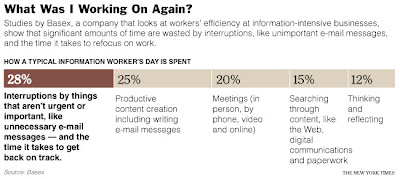Is
Alan Cheslow's blog a new form of blogging?
Or will my next blog be
Twistori like, a sort of
FriendFeed lifestream in perpetual motion, automaticaly scrolling...endlessly flowing on line.
If my life is transferred into an online scrolling lifestream matrix soon, I wonder how I will be able to manage all this information by following others feeds, without losing too much of my "productive content creation" time?
Already I can hardly manage my Friendfeed lifestream because I'm overloaded by too many feeds from people I consider interesting.
Is the future of the Web [or online information systems] above all, in
aggregation and
filtering? Below is an interesting poll from the New York Times article, published few months ago about how people are spending [wasting] their office time.
According to this poll, if we could decrease our online
distraction time (or "interruptions" such as reading mails, following others lifestream feeds, chatting, etc...) and the time we spend on
searching information , we could increase our "productive" time by 43 % .
And even if aggregation and filtering systems do not eliminate our need for distraction, at least, we will feel a little less lost and overloaded by gathering all this streaming online information.
The question is who can we authorize to aggregate and filter for us?
To be really reliable, this machine has not only to simulate our own value system [reflect our need for security] but also has to be able to push us beyond our intellectual safe zone [make us curious and able to accept the Alterity].


